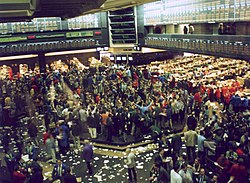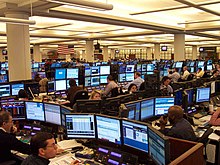Our website is made possible by displaying online advertisements to our visitors.
Please consider supporting us by disabling your ad blocker.
Commodity market


A commodity market is a market that trades in the primary economic sector rather than manufactured products, such as cocoa, fruit and sugar. Hard commodities are mined, such as gold and oil.[1] Futures contracts are the oldest way of investing in commodities.[citation needed] Commodity markets can include physical trading and derivatives trading using spot prices, forwards, futures, and options on futures.[clarification needed] Farmers have used a simple form of derivative trading in the commodities market for centuries for price risk management.[2]
A financial derivative is a financial instrument whose value is derived from a commodity termed an underlier.[3] Derivatives are either exchange-traded or over-the-counter (OTC). An increasing number of derivatives are traded via clearing houses some with central counterparty clearing, which provide clearing and settlement services on a futures exchange, as well as off-exchange in the OTC market.[4]
Derivatives such as futures contracts, Swaps (1970s–), and Exchange-traded Commodities (ETC) (2003–) have become the primary trading instruments in commodity markets. Futures are traded on regulated commodities exchanges. Over-the-counter (OTC) contracts are "privately negotiated bilateral contracts entered into between the contracting parties directly".[5][6]
Exchange-traded funds (ETFs) began to feature commodities in 2003. Gold ETFs are based on "electronic gold" that does not entail the ownership of physical bullion, with its added costs of insurance and storage in repositories such as the London bullion market. According to the World Gold Council, ETFs allow investors to be exposed to the gold market without the risk of price volatility associated with gold as a physical commodity.[7][8][notes 1]
- ^ "Soft Commodity Definition". Investopedia. 15 February 2009. Retrieved 6 December 2012.
- ^ "Opportunities and Risk: an Educational Guide to Trading Futures and Options on Futures" (PDF). Chicago, Illinois: National Futures Association. 2006. p. 6.
- ^ O'Harrow, Robert (21 April 2010). "A primer on financial derivatives". Washington Post.
- ^ "Understanding Derivatives: Markets and Infrastructure - Federal Reserve Bank of Chicago". Chicagofed.org. Retrieved 23 August 2018.
- ^ "The Regulation of Derivatives in Canada". Expert Panel. 2007.
- ^ Loder, Asjylyn (18 July 2010). "Commodity Manipulation May Be Easier to Prove After Overhaul". Bloomberg.
- ^ Bytom Lauricella (2 November 2009). "Gold Mutual Funds Vs. Gold ETFs: It Depends on the Goal". Wall Street Journal. Retrieved 3 October 2011.
- ^ "The Future of Commodity ETFs". Morningstar. 25 August 2009. Archived from the original on 8 January 2017. Retrieved 3 October 2011.
Cite error: There are <ref group=notes> tags on this page, but the references will not show without a {{reflist|group=notes}} template (see the help page).
Previous Page Next Page



